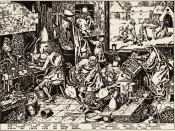Kaylie Goodwin
Human Growth and Development
09/22/2014
The Alchemist, by Paulo Coelho
I feel like this book ties into our class in more ways than one, but the comparison that stands out the most is intuitive thought versus analytical thought. On page 336 of our text book, intuitive thought is defined as; Thought that arises from an emotion or a hunch, beyond explanation, and is influenced by past experiences and cultural assumptions. Analytical thought is defined as; Thought that results from analysis such as a systematic ranking of pros and cons, risks and consequences, possibilities and facts. Analytic thought depends on logic and rationality.
The Alchemist is about a young shepherd boy named Santiago who sets out on a pilgrimage to find his "Personal Legend" Along the way, he learns to listen to his heart and realizes that his dreams, or treasure are not just his, but part of the "Soul of the Universe".
I equate the beginning of Santiago's path to Intuitive Thought. The invitation to Life Span Text book References Intuitive Thought as thought that takes place in more youthful times, and Analytical thought taking place as a human being matures.
In the beginning of the Alchemist, Santiago is humble and really doesn't seek to explore the world; he is happy being a shepherd, reading his book, and drinking his wine while he tends to his flock. He doesn't desire more in life until he is presented with a recurring dream of a great treasure hidden thousands of miles away at the base of the Egyptian Pyramids. He is deciding his fate when he meets Melchizedek, a wise man who claims to be a king from a far-off land. The old man gives Santiago two stones, Urim and Thummim, to help him make decisions on his...


